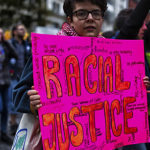SAN ANTONIO—Too often, churches have trailed society at large in terms of embracing racial and ethnic diversity, a multiethnic panel told a regional New Baptist Covenant II gathering in San Antonio.
“I believe what we see on this stage is what our future must look like,” said Victor Rodriguez, pastor of South San Filadelfia Baptist Church in San Antonio, glancing at the other three panelists—another Hispanic, an African-American and an Anglo.
Rodriguez, immediate past president of the Baptist General Convention of Texas, told a group at Trinity Baptist Church in San Antonio that Christians in various ethnic groups “must begin to think of church in different ways.”
Children who grow up attending multiethnic schools and laity who work alongside coworkers from varied cultures often understand racial and ethnic diversity better than the church does, said Jesse Rincones, pastor of Alliance Church, a multiethnic congregation in Lubbock.
“How does the church play catch-up?” he asked.
In part, churches can enter into true partnerships across racial and ethnic lines, he noted. But collaborative partnerships among churches need to be full partnerships of equals, he emphasized.
“In the New Testament, we don’t see junior partners or senior partners. We see partners,” Rincones said.
Love is the hardest thing God commanded, because it forces people to step outside their comfort zones and embrace people who are different, said Michael Brown, pastor of True Vision Church in San Antonio.
“Love does not mean we are blind to race and color or that we deny our cultural differences. Love is not about erasing those things. It is about coming together with our differences and learning from each other,” Brown said.
Sign up for our weekly edition and get all our headlines in your inbox on Thursdays
Unfortunately, what society has learned from Baptists has not always been positive. Too many Baptists have modeled for the world how Christian who disagree with each other fuss and fight, said Les Hollon, pastor of Trinity Baptist Church in San Antonio.
“But we have the opportunity to model what it means to have unity of heart in the midst of racial diversity,” he said. “It will mean we need to see the world as Christ sees the world.”
Churches also can model what it means to be forces for reconciliation and centers for recovery, Hollon added, as well as examples of integrity in a culture that craves them.
In order for churches to model restoration and reconciliation in a culture that fails to understand the power of redemption, Christians must move beyond predetermined notions regarding politics and ideology, Rincones said.
Christian learn how to move beyond barriers when they look ex-offenders, undocumented immigrants and other outcasts as individuals rather than categories, he added.
“We only dream of setting captives free when we know a captive or a captive’s child. We only desire to bind up the broken-hearted when we know someone who is broken-hearted,” he said.
Churches can expand opportunities for understanding by engaging in ministries that push them to cross barriers and experience different cultures, Hollon said.
“We can give people experiences of seeing that which they fear,” he said.














We seek to connect God’s story and God’s people around the world. To learn more about God’s story, click here.
Send comments and feedback to Eric Black, our editor. For comments to be published, please specify “letter to the editor.” Maximum length for publication is 300 words.